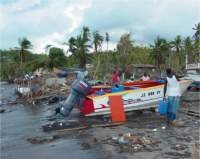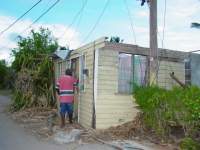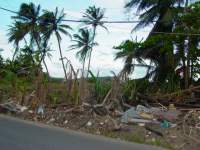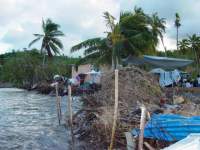 |
Contact usUnited CaribbeanDisaster Mitigation
Community Empowerment
Disaster Action Kids Club
The Body of Christ
|
home >> united caribbean
trust  AMANDA
LYNCH-FOSTER in Grenada
AMANDA
LYNCH-FOSTER in GrenadaFriday 24, September-2004
It had rows of quaint, colourful chattel houses right on the golden-sand beach, the aquamarine Caribbean sea swishing gently in the background and fishing boats bobbing on the waves or pulled up on the shore, dotting the landscape with bright colours.
The idyllic little fishing village is now a scene of utter devastation. Where houses once lined the beach, only the shattered vestiges remain strewn along the coastline. The stone foundations and occasionally a set of stone steps are all that remain as testament to human life before Ivan.
Lukita Pursue is hard at work – the morning sun glistens off the sea water and the sweat on her brow as she chops at a fallen coconut tree on the spot where her home once was. “We have to pick up pieces what we can,” she says stoutly as her daughter, one of her three children, plays in the background and smiles prettily for the camera. A few feet up the road, Sheila Phillip and her step-mother Levette Richardson sit outside one of the few places that remain standing – a wall shop and attached house. |
|
|
“It wasn’t a nice sight,” says Phillip, describing how the sea came rushing up to their houses hours before the hurricane itself had even hit. “Look how it calm now and it was all over the trees,” she marvels, relating that the sea swept past their houses on the beach, across to the other side of the road. Phillip fled from her home as the hurricane blew off her roof and sent the sea surging into her house. “Downstairs the sea took everything it could take,” says Phillip, her blonde dreadlocks bobbing as she shook her head in disbelief. “I try to run for safety and I still lost,” says Phillip mournfully, pulling on the cloth she has wrapped around her. Richardson, who lost her husband last year, lost the home she and her three children lived in when Hurricane Ivan visited. She was in the nearby town of Grenville, the main town in the parish of St Andrews buying stock and when she returned home, the sea was already in an uproar. “I saw a wave as tall as that come in my house,” she says, indicating with her arm and raising it near to her shoulder. They fled to the house of a relative, but the roof came off there as well. “We were inside the house and just bawling, bawling, bawling,” remembers Richardson of the terrible day. As night fell, they made for safety at another house nearby. “I came up in the night with the bag on my back in the rain so,” says Richardson, demonstrating how she struggled against the whipping winds of Ivan to make it to the crowded safe-house. “Thirty of us were in that house that night. That was the worse I ever experience, papa! Woooiiee! I didn’t sleep for two days afterwards,” says Richardson, clutching her stomach.
Peering out of one of these shacks by the sea is Julie Sanderson. She is cooking a small meal in a borrowed pot with food she managed to scrounge-up from foreign army officers who had passed through Soubise. She, her husband Errol and their seven children lost everything to the rage of Hurricane Ivan. “I didn’t want the hurricane to come because I know I have a lot to lose,” says Errol, still speaking in the present tense of the comfortable life he once had. Picking through what is left of the four-bedroom house he built only two years ago, the fisherman of 31 years lists what he and his large family have lost: Televisions, two VCRs, a stereo set, fridge and washing machine – about EC$45 000. His boat, worth $11 000, was damaged by the hurricane and he is trying urgently to get it repaired so that he can again begin to make a living for his family. “I does just cry you know,” comments Julie sadly, telling how she and her family now split their time between a shelter and their tiny shacks. “They don’t like that, but they still have to cope with it. Sometimes all of us sleep here,” she says. Food is hard to come by – like many other Grenadians, she emphasises that “nobody” has come as yet to their aid. Their water source is from the standpipe which Julie suspects is contaminated as it has made she and her children repeatedly sick. Her greatest concern is for her children who she says have been traumatised by recent events. “They took it badly! Because it take their clothes – people have to give them some clothing,” she says. Four of her children are of school age. Briefly, her eyes light up when she notes proudly that her daughter is very bright, and had aspirations of being a doctor. Now all her books, as well as those of her siblings are destroyed and her daughter’s mood is bleak every day. “She just sit down and cry and cry. She’s fed-up,” says Julie worriedly. Despite the devastation of Ivan, Julie notes they will probably have to rebuild in the same spot when they eventually can. “We want to build back, but we have no money, nothing. We don’t have no land or money to buy land. We still have to build back here.” Not so for Phillip and Richardson who have vowed that they will never again live so close to the sea. “I’m going to rebuild in a different spot. I don’t trust the sea,” says Richardson. “Look the sea all make room now to do even worse. Leave the sea alone,” agrees Phillip. Compliments of the Nation News |
| Copyright © 2022 www.UnitedCaribbean.com. All rights reserved. Disclaimer Click to Contact us |
 Once
the sea gave them livelihood, but when Hurricane Ivan visited, in a few
terrible hours it swept away all the houses. All!
Once
the sea gave them livelihood, but when Hurricane Ivan visited, in a few
terrible hours it swept away all the houses. All!  Dazed
residents walk along the shore, picking through their broken galvanise
sheets, broken coconut trees and broken dreams.
Dazed
residents walk along the shore, picking through their broken galvanise
sheets, broken coconut trees and broken dreams. 







 They
recall vividly the day Hurricane Ivan came, first stirring up the seas
and then blowing their houses away, one after another.
They
recall vividly the day Hurricane Ivan came, first stirring up the seas
and then blowing their houses away, one after another.  Since
the passage of Ivan villagers have been trying to come to grips with the
ruination the hurricane inflicted on them. The sounds of hammering and
sawing filled the air as villagers started the work of rebuilding.
Since
the passage of Ivan villagers have been trying to come to grips with the
ruination the hurricane inflicted on them. The sounds of hammering and
sawing filled the air as villagers started the work of rebuilding. Many are living in temporary shacks they have cobbled together from the
remains of the hurricane – make-shift residences of plyboard and
rusting galvanise.
Many are living in temporary shacks they have cobbled together from the
remains of the hurricane – make-shift residences of plyboard and
rusting galvanise.